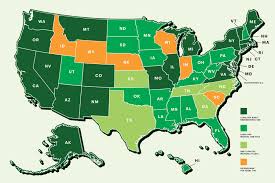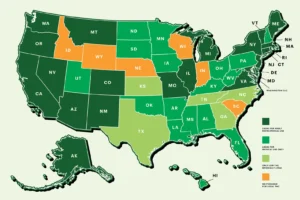Legal Weed States, In recent years, the landscape of cannabis legality in the United States has undergone a dramatic transformation. What was once a contentious issue has become a pivotal part of state policies across the nation. This article explores the rise of legal weed states, highlighting their impact on the economy, society, and the broader legal framework.
Understanding Legal Weed States
Legal weed states are those jurisdictions where cannabis is legal for recreational or medicinal use, or both. The movement toward legalization began in earnest in the early 2010s and has since gained substantial momentum. As of now, a significant number of states have embraced some form of legal cannabis, reflecting a growing shift in public opinion and policy.
The Pioneers of Legalization
The journey towards widespread legalization began with Colorado and Washington in 2012, when they became the first states to legalize recreational cannabis. Their success set a precedent and provided a model for other states to follow. California soon joined the ranks in 2016, followed by several others, including Oregon, Nevada, and Illinois.
The trend is not limited to the West Coast. States such as New York, New Jersey, and Connecticut have also implemented recreational cannabis laws, expanding the reach of the legal weed movement. The approval of these measures often comes through referendums, legislative actions, or executive orders, reflecting a diverse approach to cannabis policy.
Economic Impact of Legal Weed States
The economic benefits of legal cannabis are substantial. Legal weed states have witnessed significant boosts in revenue from taxation and licensing fees. For instance, Colorado reported over $2 billion in cannabis sales in 2023, translating to hundreds of millions of dollars in tax revenue. This influx of funds has allowed states to invest in infrastructure, education, and public health programs.
Moreover, the legalization of cannabis has created thousands of jobs in various sectors, including agriculture, retail, and distribution. This economic boon extends to ancillary industries such as security, marketing, and technology, all of which play a role in the cannabis ecosystem.
Social and Legal Implications
The legalization of cannabis has profound social implications. It has led to a reduction in drug-related arrests and has contributed to a shift in societal attitudes toward drug use. Legal weed states often report a decrease in the number of marijuana-related criminal charges, which has significant ramifications for the criminal justice system.
Furthermore, the legal status of cannabis has spurred important conversations about drug policy reform, racial justice, and the impact of the War on Drugs. Many advocates argue that legalization helps address some of the disparities caused by previous drug enforcement policies.
Challenges and Considerations
Despite the positive developments, the path to legalization is not without challenges. Legal weed states grapple with issues such as regulatory compliance, black market competition, and public health concerns. Additionally, the conflict between state and federal laws continues to create legal ambiguities, as cannabis remains illegal at the federal level.
States must navigate these challenges while striving to ensure that their legal cannabis markets are both profitable and responsible. Effective regulation and enforcement are crucial in maintaining the integrity of the legal cannabis industry.
The Future of Legal Weed States
The trend toward legalization is likely to continue as more states consider the benefits of legal cannabis. The evolving landscape suggests that more jurisdictions will move towards legalization in the coming years, driven by both public support and economic incentives.
As the legal weed movement progresses, ongoing research and policy adjustments will be essential to address emerging issues and optimize the benefits of legalization. The experiences of early-adopting states will serve as valuable lessons for others considering similar measures.
In conclusion, the rise of legal weed states represents a significant shift in American drug policy. With its economic, social, and legal implications, the legalization of cannabis continues to shape the national conversation and influence future legislative actions.
You Might Also Like These:



